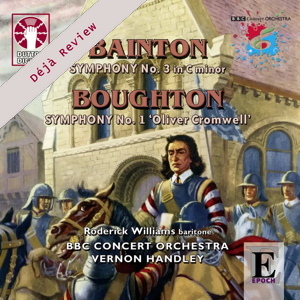
Déjà Review: this review was first published in March 2007 and the recording is still available.
Edgar Bainton (1880-1956)
Symphony No. 3 in C minor (1956)
Rutland Boughton (1878-1960)
Symphony No. 1 “Oliver Cromwell” (1905)
Roderick Williams (baritone)
BBC Concert Orchestra/Vernon Handley
rec. 2006, Colosseum, Watford Town Hall, UK
Dutton CDLX7185 [79]
English-born, Australian-resident Edgar Bainton wrote three symphonies as did Rutland Boughton.
The Bainton Second Symphony is available on Chandos but was recorded on an Australian LP before that. The conductor was Joseph Post. His First Symphony or at least its first movement, Genesis, is on ClassicO.
Boughton’s Second and Third symphonies were on a long-deleted BBC Radio Classics CD (15656 91892) while the Third can still be easily tracked down on Hyperion Helios CDH55019 previously at full price CDA66343.
Bainton’s Third Symphony is a work of potently sustained atmosphere – given to impressionistic textures. At various times I was put in mind of other late romantic works such as Bax’s Spring Fire, Alfvén’s Symphony No. 4, the second movement of the Moeran Symphony, the melancholic aspects of Bantock’s Pierrot of the Minute and the dream-visionary textures of RVW’s A London Symphony. This phantasmal and refulgent yet delicately orchestrated work is in four movements. Throughout them the imagery of the sea is to the fore – the composer died while swimming in the sea. A more physical energy – suggestive of a war dance – enlivens the finale although it is by no means as possessed and feral as the ancient live version recorded in grindingly distressed sound at the premiere by the Sydney SO conducted by Sir Bernard Heinze on BROLGA LP BZM12. Dutton nevertheless provide an intensely sympathetic performance as is to be expected from this conductor and from an orchestra that has a long broadcast tradition of revivals. If you are looking for a large-scale visionary-impressionistic Baxian symphony then look no further. This is a treasurable work full of ineffable beauty and wild insight. Unique.
It is perhaps typical of Boughton that even as early as 1905 he selected Cromwell as the subject for his First Symphony. One can imagine his younger colleague Alan Bush making a similar choice. Neglected as unfashionable and politically unacceptable because of his communist beliefs for most of his life Boughton wrote a symphony that was buried even deeper than the rest of his oeuvre. It had to wait until 2005 for its premiere. Attempts at concert performances in 1905-6 with the Liverpool Phil, the RCM and the LSO all came to nothing. The lack of performing materials hardly helped. Paul Adrian Rooke has put that right no doubt after many hours slaving over the manuscript and Sibelius software.
The four movements of the Boughton are: 1. A character study; 2. Cromwell’s letter to his wife after the battle of Dunbar; 3. March of the Puritans; 4. Death scene. The first movement is a dramatic fusion of the idioms of Elgar and Tchaikovsky. The latter’s influence carries over into the touching music of the second movement with its Romeo and Juliet textures. The March of the Puritans could easily have been queasy but Boughton produces a creditable Elgarian nobility with Beethoven-style stabbing fate motifs along the way. The finale includes a setting of Cromwell’s last prayer sung here with grave fervour by Roderick Williams. The work ends in a convincing sunset glow with a remarkably inventive sinuous paraph from the solo violin signalling the end of this fine symphony.
The complementary notes are by Garry Humphreys (Bainton) and Paul Adrian Rooke (Boughton). The latter edited and transcribed the Cromwell symphony from manuscript; a service he has also performed for Boughton’s masterly opera The Queen of Cornwall. The connection is even closer because Rooke directed the world premiere in a Hitchin SO concert on 26 November 2005. I hope we will hear Rooke recording as a conductor in repertoire of this rarity and strength. It is worth noting that he has written two muscular and imaginative symphonies of real emotional reach. We need to cherish gifted and completely committed conductors of Mr Rooke’s insight as we do others who to date have never attracted national attention. Others to watch and mark include the fiery and imaginative John Longstaff currently working with the Sheffield Symphony Orchestra, John Gibbons and the Ealing Symphony Orchestra, Christopher Fifield and further afield John McLaughlin Williams.
Again I must congratulate Dutton on the distinctive visual identity they establish with their booklets and inserts. Their use of British Transport poster details and the like is a welcome hallmark of the Epoch series.
The recording is fine – open and detailed yet warm-toned.
This is a much needed project resplendently carried off by all concerned. The Bainton work is the stronger of the two works and especially for this reason the disc deserves to do extremely well.
It comes as no surprise to see Vernon Handley pioneering these works on compact disc. He is already familiar with the Bainton Second from the Chandos recording and the Boughton Third from the Hyperion – now Helios. However let’s not underestimate the sheer solid work in getting to grips with the mass of notes and the differing nuancing and style of these two highly individual composers. Then comes the alchemy of drawing the sound of a piece of music from a score that will have been unknown to this orchestra. The whole process has been not merely achieved but triumphantly realised. Handley seems tireless in his imaginative dedication and later this year we will hear his Chandos recording of Bantock’s choral-orchestral epic Omar Khayyam. In terms of getting to grips with new scores is there any other conductor as productively insightful and tenacious.
Rob Barnett
Buying this recording via a link below generates revenue for MWI, which helps the site remain free.



















